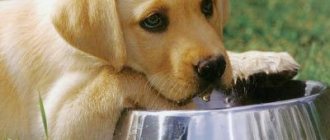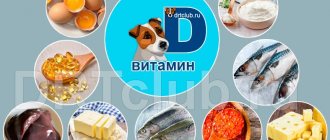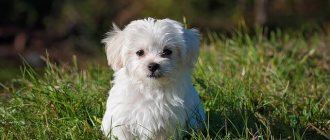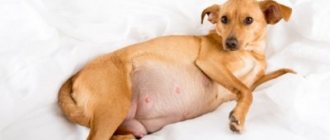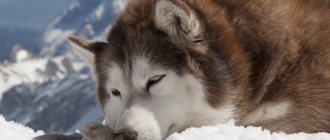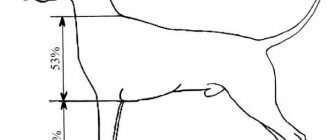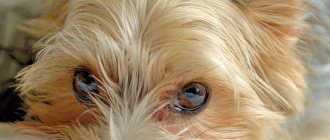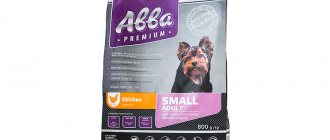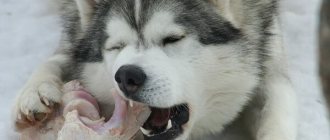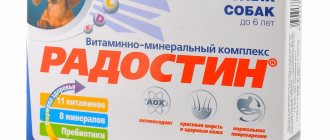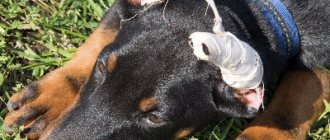What are vitamins for?
The quality and type of wool depend on various factors:
- dog health;
- presence of skin problems;
- diet;
- the presence of skin or intestinal parasites;
- the dog's susceptibility to allergies;
- levels of vitamins and minerals in the body;
- current stage of seasonal molting.
Vitamin deficiency causes excessive hair loss, fragility, excessive dry skin, and dandruff. A lack of necessary substances can also manifest itself in the form of diseases: dermatitis, frequency, dermatomycosis, eczema, pyodermatosis. Loss of brightness of color, as well as general lethargy of the dog, can also indicate the presence of vitamin deficiency.
If you find one or more of the listed signs, then this is a good reason to take your pet to the veterinarian, review the diet and add suitable vitamin supplements to it.
When is hair loss normal?
One of the signs of an animal’s excellent well-being and health is considered to be shiny, smooth, silky fur without bald patches or tangles. A healthy animal is also distinguished by a cold, wet nose, excellent appetite, playfulness and activity.
As a rule, hair loss is not identified as an independent symptom; the process is a harbinger or consequence of rare mobility, low weight, redness and laxity of the skin, which undoubtedly indicates that the pet is unhealthy. Hair loss in a dog is a good reason for an urgent visit to the veterinarian.
With satisfactory condition and proper care, your pet's hair may fall out exclusively during the shedding season (usually this occurs in autumn and spring). At other times, hair loss is considered a sign of a dog's health problems.
Hair loss can also be caused by an overabundance of medications and vitamins in the pet's body. It is not advisable to use stimulating supplements and vitamins for hair growth in dogs unless necessary. Such manipulations can lead to a deterioration in the animal’s health and divert the owner’s attention from more important problems with the pet’s health.
Kinds
Vitamin A (retinol) is one of the most important elements in the body. Lack of retinol reduces immunity and negatively affects health and coat. Vitamin A is found in egg yolk, corn, milk, pumpkin, carrots, beef, and liver.
Vitamins of group B (B1, B2, B6, B12) – their deficiency negatively affects the condition of the coat, skin and mucous membranes. Can lead to skin diseases, anemia, neuroses. Useful sources of B vitamins for dogs include: brewer's yeast, whey, lamb, fish, chicken, offal, beef.
Vitamin PP is responsible for regulating fat and protein metabolism; its deficiency can lead to dermatitis, dry skin and disorders of the nervous system. Sources of vitamin PP include yeast, legumes, fish, and liver.
Vitamin E (tocopherol) – plays an important role in skin health. Wheat sprouts, eggs, and vegetables are rich in tocopherol.
Vitamin D is an important element for the health of your pet, without which proper growth and development is impossible. You can get this vitamin by adding cod liver and fermented milk products to your diet.
Vitamin H (biotin) also has a significant effect on the health of the dog’s skin, and therefore the coat. Biotin is found in molasses (molasses) and liver.
Vitamin F (linoleic, linolenic, arachidonic acids) are unsaturated fatty acids that are not synthesized in the dog’s body, and therefore must come from outside. Vegetable oils (sunflower, flaxseed, raspovaya), soybeans, corn, peanuts, sesame, olives are rich in these elements.
Vitamin C (ascorbic acid) – a lack of ascorbic acid leads to decreased immunity and reduced collagen production. This negatively affects the body's resistance to skin diseases and the general condition of the coat. Sources of vitamin C for dogs are vegetables (peas, cabbage, pumpkin, turnips, bell peppers) and fresh herbs (spinach, parsley).
The listed vitamins are a necessary complex that should be contained in the diet of every dog for full development, health and good coat condition.
The role of vitamins in the life of animals
Shedding is a natural process, and all dogs are susceptible to it 2 times a year (when changing warm and cold seasons).
Puppies also go bald at an early age, when the delicate baby fluff is replaced by adult coarse hair. The process is slow and imperceptible.
When the loss of bristles is intense and not at the right time, you should look for the reasons. Various factors influence this: diseases, worms, stress, improper care, one of the components of which is unbalanced nutrition.
Vitamins are of great importance for dog fur. To properly create a diet, you need to know which components are important for your pet.
Vitamins that are good for dogs' health
| Name | Benefit | What does vitamin deficiency entail? |
| Retinol (A) | Takes part in the synthesis of elastin, collagen, keratin | The hair loses its silkiness, the bristles become brittle |
| Group B | Nourishes the bulb, normalizes the functioning of the sebaceous glands | The growth of the undercoat slows down, intense hair loss is observed, and the skin peels off. |
| Ascorbic acid (C) | Supports the protective functions of the entire body. Nourishes hair follicles and improves their blood supply | Decreased immunity leads to sudden molting. At the same time, the fur becomes dry and loose |
| Calciferols (D) | Helps the body absorb phosphorus and calcium | The dog not only goes bald intensively, it begins to have problems with the musculoskeletal system |
| Tocopherol (E) | A powerful antioxidant that supports the normal reproductive system | Hair doesn’t just break and fall out, hair follicles die, and the dermis loses its ability to recover |
The dog's body needs bioflavonoids (vitamin P) and polyunsaturated acids (vitamins F). Their deficiency leads to a failure of keratin synthesis, and the pet’s claws begin to break, hair falls out, and the skin loses its healthy appearance.
Indications for use
Before giving your dog vitamins, you need to understand whether they really are needed. Only a veterinarian can answer this question. As was said just above, the first call to contact a veterinarian will be an unseasonal heavy loss of six in your pet. If the fur becomes dull and begins to fall off, this may be a sign of a lack of essential vitamins and minerals in the body.
Dogs that are kept on a natural diet or on budget industrial food, as well as during the period of active molting, are especially susceptible to such a shortage. In “super-premium” or “holistic” food classes, the composition is usually well balanced and already contains all the necessary elements. The same cannot be said about food in the budget segment; their content of vitamins and minerals is very low.
When feeding “natural” it is very often difficult for owners to provide their pet with all the necessary substances due to lack of information, experience in this matter, or, simply, free time.
Based on the results of the examination and analysis of the diet, the doctor will determine whether vitamin deficiency occurs and whether your pet needs additional supplements or whether it will be enough to simply change the diet.
Active hair loss during shedding
Almost every dog begins to shed twice a year. The duration of this process is usually no more than five weeks. This process is characterized by persistent hair loss, therefore, combing must be done as often as possible. This should not cause any concern, since annual shedding is a normal canine biological process.
However, there are situations when shedding lasts throughout the year, which should be a reason for an urgent visit to the veterinarian. Thus, year-round hair loss can occur for the following reasons:
- pet food is chosen incorrectly;
- helminthic infestations or other parasites in the animal’s body;
- using the wrong grooming products;
- use of antibiotic tablets or other medications;
- stressful situations or other instability of the nervous system;
- hormonal imbalance;
- lichen formations;
- allergies to shampoo or food;
- The dog has any pathologies of internal organs.
To correct the situation and stop hair loss, use shampoo for dogs for persistent hair loss, vitamins for pet dogs for hair loss, or medical medications necessary for hair loss in dogs.
How to choose
If you have received a recommendation from your doctor to add vitamin and mineral supplements to your dog’s diet, then you are faced with the question of choosing what exactly to buy.
There is now a very large selection of all kinds of supplements for dogs on the market, designed to solve specific problems. When making a choice in favor of any drug, you need to start from the causes of your pet’s hair problems, its breed, coat type, age and diet. The fewer vitamins in the daily diet, the richer the composition of the supplements should be and vice versa.
Pay attention to the amount of natural ingredients and the absence of chemical additives, which may not only bring no benefit, but also harm your dog’s health.
The following components are desirable as part of vitamin complexes for wool: vitamins A, B, E, C, D; biotin; amino acids; fatty acid.
The dog has problems with its fur
Planned molting in a healthy animal takes from 10 days to 2 weeks.
When the process takes longer than expected or the hair falls out at a different time, and the pet’s appearance becomes sloppy, you should pay attention to the pet’s menu.
If your dog doesn't have enough vitamins, it's easy to fix.
It is enough to rearrange the diet so that it contains products containing the necessary components.
Required Products
| Name | Description |
| Lean meat | Has a balanced composition of vitamins and amino acids that provide nutrition to all tissues |
| Liver | Source of vitamins A, K, B and iron |
| Cottage cheese | Thanks to its high protein and calcium content, it strengthens the hair structure. |
| Coconut oil | Protects the immune system, participates in the synthesis of acids, which makes the coat smooth and shiny |
| Carrots, pumpkin | Main source of vitamin A and beta-carotene. They help improve the functioning of the gastrointestinal tract, which helps to improve the health of the dermis and gives the coat softness and a beautiful shine. |
| Eggs | Strengthen the structure of the bristles, improve regeneration processes |
| Peas | Contains thiamine (component B), potassium and phosphorus |
Fresh fruits (especially apples and pineapples) are good for your dog - they are a source of minerals, vitamins and fiber. The owner also takes care of the appearance of the pet, regulating its nutrition.
What vitamins to give
A balanced diet contains a full range of nutrients necessary for the animal .
But if problems with the coat begin, it would not be a bad idea to introduce special vitamin supplements. They are sold in the form of tablets, powders, or packaged in ampoules.
What vitamins should I give dogs against hair loss?
To replenish hair, you will need retinol, biotin and a number of other components of group B. Fatty acids and brewer's yeast are needed. Experienced breeders recommend paying attention to such dietary supplements as CaniDerm, Skin&Shine, Excel, Velkote.
What vitamins should be given to dogs for rapid hair growth? An animal that is completely or partially bald looks painful and unattractive. Therefore, it is important not only to stop excessive hair loss, but also to speed up its restoration.
Along with the use of external influences (shampoos, balms, masks, applications), preparations for rapid growth containing vitamins are introduced into the diet - Polidex Super Wool, 8 in 1, oil formulations Skin Shine and Velkot.
What do puppies need?
Noticing that the baby has begun to shed, inexperienced breeders panic.
From 2 months to 9 months (when switching from breastfeeding to other foods), puppies' coat matting is a natural process: the delicate fluff goes away, and dense villi grow to replace it.
Sometimes, for certain reasons, adult fur is in no hurry to appear. In this case, the diet is reviewed and supplemented with vitamins, relying on tocopherol and retinol.
Biotin helps speed up the emergence of mature hair and gives it a healthy shine.
When using vitamins for puppies, take into account that their metabolic processes occur faster than in adults, so the complex must be enhanced, but it is important to choose the right dosage of the drug.
Of the domestic formulations, you should pay attention to Omega Neo, Biorhythm.
Vitamins for black wool
Not only the length of the coat is a sign of the breed, but also its color. The black color is provided by the pigment eumelanin. In order for it to be synthesized in the required quantity, the body must receive vitamin F and group B components.
Other substances are also necessary for black wool:
- K, E, A – for uniform distribution of pigment throughout the body;
- D, C, R – for color intensity.
Lack of vitamins leads to spotting, mixed shades or changes in color saturation.
Depending on age
At different ages, dogs' needs for vitamins and microelements change. This means that vitamin supplements should not be the same for growing, adult and older dogs.
Vitamins for puppy coats should be selected taking into account the needs of the growing body. For babies, first of all, they need substances responsible for proper development. The need for vitamins in puppyhood is higher than in adults, so you should not give your baby vitamin complexes intended for adults. Special ones marked “For puppies” will suit him.
For an adult active animal, the set of necessary substances will be completely different, designed primarily to maintain health and replenish daily energy costs.
For older animals, medications are selected taking into account the breed, age-related changes in the body, susceptibility to disease and the condition of the gastrointestinal tract. Nutritional supplements for aging dogs are balanced to be effective yet gentle on the body.
If your dog is allergic, then the composition of the drug should be studied especially carefully to eliminate any unwanted components. Try to choose those vitamin complexes that are marked “suitable for dogs prone to allergies.”
Popular vitamin and mineral supplements
“8 in 1” Excel Brewers Yeast with brewer’s yeast
Additive made in Germany. Contains brewer's yeast, vitamins, fish oil, zinc, copper. Provides healthy skin, thickness of the undercoat, shine and elasticity of the coat. The line includes complexes for puppies, small breeds, large breeds and older dogs.
Phytoelite
The drug is made in Russia. It contains many useful medicinal herbs: burdock, chamomile, nettle, horsetail, string. The drug improves immunity, has a general strengthening and anti-inflammatory effect. Suitable for adult dogs and puppies.
Anivital CaniDerm Tabs
Vitamin complex made in Germany, based on brewer's yeast, it contains about 30%. And also: biotin, fatty acids, grape seed extract. This drug is suitable for continuous use for problems with dry skin, dermatitis and allergies.
Improves hair structure, prevents age-related changes in the skin, and has a positive effect on the functioning of the cardiovascular system.
Quantum (“Sherstevit”)
Mineral feed additive produced in Russia. It contains B vitamins, as well as vitamins A, D, and C. Contains calcium, sulfur, and seaweed. Promotes active growth of shiny and thick coat, prevents dandruff and premature shedding.
Polydex "Super wool plus"
Vitamins produced in Russia, suitable for daily use. Can be given to both adult dogs and puppies from one month. Contains a rich complex set of vitamins, minerals and amino acids.
Brewers “8 in 1” with brewer’s yeast.
Additive made in the USA. The drug contains a complex of vitamins, Omega-3 fatty acids, amino acids and minerals. Suitable also for pregnant women and lactating females.
Beaphar Vit Total, Beaphar Laveta Super
Vitamin complex in liquid form. The liquid additive is convenient to add to water or feed. Contains the necessary vitamins, amino acids, and calcium. Country of origin: the Netherlands.
Contraindications
Taking vitamin and mineral supplements may be contraindicated if your pet has:
- allergy to any component;
- the diet already contains enough essential substances;
- An excess of vitamins was detected in the body.
Cases of excess vitamins (hypervitaminosis) are quite common. This is usually an excess of vitamins A and D in puppies.
Many owners, seriously fearing rickets, begin to intensively add vitamin D to their diet. The consequence of such uncontrolled use can be irreversible processes in organs and tissues. The level of calcium in the blood increases, which causes the deposition of mineral salts on the walls and tissues of internal organs.
The harmful effects of hypervitaminosis affect the nervous system and affect the condition of the skin and coat. With an excess of vitamin A, loss of appetite, loss of body weight, dry cornea, skin rashes and severe hair loss appear.
Excess vitamin B leads to various allergic reactions. Elevated levels of vitamin E cause disturbances in the functioning of the heart and blood vessels, which increases the risk of strokes and heart attacks.
In what cases to give and what vitamins are needed
A dog's appearance is a reflection of its health. As soon as the condition of the coat worsens, sound the alarm. This indicates one of the possible problems with the body:
- skin diseases - dermatitis, eczema, fungal infections, lichen;
- lack of nutrients – occurs in animals fed on cheap feed or unbalanced natural food;
- stress;
- parasitic infestations – infection with helminths, fleas, ticks;
- allergies – often food (nutritional);
- systemic diseases in acute or chronic stages.
Pay attention to our other ratings:
- Anthelmintic for dogs
- Anti-tick and flea drops
- Painkillers for dogs
- Sedatives for dogs
There are also non-dangerous situations in which hair loss is inevitable:
- shedding: usually occurs in spring and autumn, but becomes constant in dogs that spend most of their time indoors;
- pregnancy and lactation: female bitches shed after giving birth;
- taking medications: hair loss is most often caused by antibiotics and hormonal drugs.
Whatever factor worsens the condition of the coat, the dog must be given vitamin and mineral complexes for the skin and coat. They are used as an addition to treatment prescribed by a veterinarian.
Another reason to introduce fertilizing into your pet’s diet is the exhibition planned for the near future. The drugs will make your pet irresistible in the ring.
When choosing a drug for a dog, take into account the breed, age, size, special conditions (pregnancy, illness, intolerance to components). Dietary supplements that contain:
- vitamin A (retinol): promotes the synthesis of collagen and keratin, improves hair elasticity, makes it shiny;
- E (tocopherol): stimulates growth, protects the skin and coat from the negative influence of the external environment - sun, wind, heavy salts in water, etc.;
- C (ascorbic acid): natural antioxidant, improves trophism (nutrition and blood supply) of hair follicles, stimulates collagen production;
- B vitamins (B1, B2, B5, B6, B8, B12): normalizes the functioning of the sebaceous glands, prevents dryness and seborrhea, improves nutrition of hair follicles and stimulates hair growth;
- PP (nicotinic acid): increases oxygen saturation of hair follicles, regulates metabolic processes, deepens color;
- group of vitamins D (D2, D3): accelerates hair growth;
- H (biotin): improves skin condition, eliminates itching, dryness, redness;
- Omega-3 and Omega-6 acids : give the coat shine, smoothness, and thickness;
- zinc : helps against hair loss, brittleness and thinning;
- sulfur : normalizes the production of sebaceous secretions, eliminates oily seborrhea;
- manganese : stimulates keratin synthesis;
- copper : accelerates collagen production, deepens the color of the coat.
Pay attention to additives that contain brewer's yeast, garlic, seaweed, fish oil, and vegetable oils. And remember that you cannot buy complexes without consulting a veterinarian. An excess of vitamins and minerals is even more dangerous than a deficiency.
Useful tips
In addition to maintaining the health of the coat from the inside out, it is important to pay attention to normal daily care. The rules of care are selected depending on the breed, length and structure of the coat, skin characteristics and lifestyle of the dog. But the main steps will be the same for all types of dogs:
Washing – this procedure should not be overused, since frequent washing harms the dog’s skin, but there is also no need to ignore this stage of care. When choosing detergents, consider your pet's breed and coat type.
Regular combing - the quality of the coat and its appearance depend on it. Combing helps get rid of dirt, dandruff, and dead skin cells. It prevents hair from matting and stimulates blood flow to the hair follicles. This procedure is equally necessary for both long-haired and short-haired dogs.
Haircut - in addition to decorative functions, it also performs hygienic ones. A haircut will help maintain cleanliness, prevent the formation of tangles, reduce the risk of parasites and irritations, and make everyday care easier.
Treatment of persistent hair loss with vitamins
The best vitamins for dogs to treat hair loss can only be recommended by a veterinarian. However, there is a certain list of useful substances that are required specifically for the proper type of pet’s coat:
- Vitamin A. This is a fairly valuable substance that is necessary for the animal’s fur to be elastic and smooth. If this vitamin is not enough, then the dog’s coat will not shine and will feel like a washcloth to the touch. To avoid such a situation, it is necessary that the pet’s diet be saturated with foods rich in vitamin A, and also offer it to the dog in the form of a medicine.
- Vitamin E. This vitamin is needed in order to maximally protect the animal’s hair and skin from negative environmental factors. If the animal receives a sufficient amount of this vitamin, hair growth increases and the coat becomes of sufficiently high quality. Vitamin E can be offered to your dog in the form of a tablet or oil that can be added to food.
- Vitamin C. If there is a deficiency of this particular vitamin in the pet’s body, then the hair begins to actively fall out, and the coat becomes loose in consistency and loses its rich color. This is due to the fact that it is this vitamin that is responsible for local immunity and forms it specifically on the pet’s skin and hair.
- Vitamins of division B. The puppy can receive these invaluable helpers both in the form of injections and in the form of special foods that are maximally saturated with them. All B vitamins direct their action solely to maximally improve the structure of the coat, restore its appearance, and also reduce hair loss of the animal.
- A nicotinic acid. This component brings its attention precisely to the intensity of pigmentation of the dog’s coat. Thus, with a lack of this vitamin, the coat becomes dull, lifeless and not bright at all.
- Healthy fat and acid. This is also necessary for the normal development of hair, which significantly enhances the quality of pigmentation, composition and appearance of the animal’s hair.
Thus, every owner should take into account that only a fully balanced complex of nutrients contributes not only to the overall health of the dog, but also to the ideal appearance of his coat.
Reviews
Ekaterina, 32 years old, Yaroslavl
“My spaniels eat natural food and, although I try to balance the diet as much as possible, I still can’t do without vitamins. The veterinarian selected the drug Fitoelita for us; it is suitable for medium-sized dogs. I give it seasonally, as needed, when signs of vitamin deficiency appear (the coat becomes dull, activity decreases). This product works for my pets and the low cost works for me.”
Lyudmila, 52 years old, Moscow
“When we bought a Chihuahua puppy, we had to choose natural feeding; he categorically refused to eat dry food. He doesn’t eat vegetables either, so it’s difficult to provide all the necessary substances with food. When the question arose of what to do about this, we turned to the veterinarian for advice. The doctor recommended 8 in 1 vitamins Excel Multi Vitamin Small Breed. The cost per package is a bit expensive (about 500 rubles), but the daily dosage depends on the weight of the animal, and for a Chihuahua it turns out to be quite economical. I give it along with food, he always eats it without problems, the results are obvious, I really like it.”
Vladimir, 45 years old, Podolsk
“I have 4 Labradors, large shaggy dogs, they are quite expensive to keep. I can’t afford expensive food, and I simply don’t have time to cook. When I noticed that the dogs’ fur had deteriorated, I went to the doctor, who said that there were not enough vitamins. The food I feed does not contain everything that large active dogs need. The pharmacy recommended Kanina vitamins, made in Germany. The price is certainly not the lowest, but it is a necessary expense. After a course of these vitamins, the result immediately became noticeable. As they say: compare “before” and “after”. The dogs feel great, they look the same, I’m happy.”
How to use
The drops are easy to use. You need to follow these simple steps:
- Break off the top of the pipette.
- Spread the fur to the sides on the neck or between the shoulder blades.
- Apply the medicine in 2-3 places.
- There is no need to rub the drug in.
Due to bio-dispersion, the components of the product are distributed over the entire area of the skin. It is important to follow simple recommendations for using Essential drops for dogs:
- If there are problems, the product should be used once a week. The course of application is 2 months, and then treatments are carried out once every 2-3 weeks to consolidate the result.
- When used for preventive purposes, the drug is applied once every two weeks.
- The medicine should be applied to places that are inaccessible for licking.
- You cannot bathe the animal 2 days before and 2 days after applying the drops.
- One pipette is designed for one treatment. Correctly select the volume of the pipette according to the weight of the animal.
